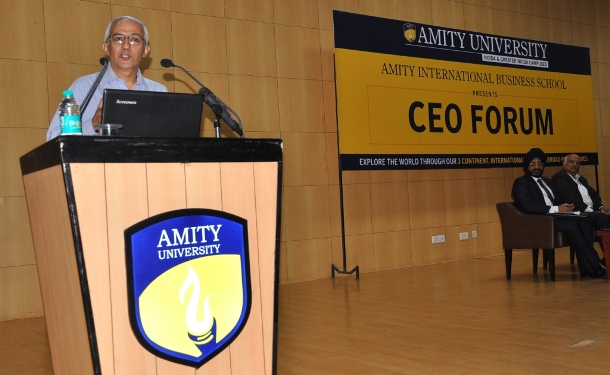14 Sep 2018|Noida | I 2 Moot Court
3rd International Business Summit on “Disruption of Globalisation: Opportunities & Challenges”

To abreast budding professionals about changing industry trends, Amity International Business School organized 3rd International Business Summit (as part of CEO Forum) on the topic “Disruption of Globalisation: Opportunities & Challenges” at Amity University, Noida Campus.
Mr. Kishore Jayaraman, President, Rolls-Royce for India and South Asia; Mr. Rajdeep Sahrawat, Head, International Business, Tata Consultancy Services and Dr.Sharda Nandram, Neynrode Business School, Netherlands were the distinguished speakers for the Plenary Session.
Welcoming the gathering, Dr. (Prof.) Gurinder Singh apprised about two types of personalities i.e. Basement Personality and Balcony Personality. He called upon the gathering to imbibe the characteristics of balcony personality since such people will always encourage, motivate and inspire to achieve the goals while people with basement personality have conservative approach towards everything. Dr. Singh shared that interactions with eminent industry leaders will help students decide on their future career path.
Addressing the gathering Mr. Kishore Jayaraman said that leadership in VUCA*world comes with unique challenges. (*VUCA is an acronym used to describe situations or environments that engender high levels of volatility,uncertainty, complexity and ambiguity). He pointed out that the major concern for businesses today is to generate employment for future generations and ensure that geopolitics doesn’t impact the functioning of the organization. He apprised that with globalization, life of complex business is limited to 15 years and it is 20 years for technology business, hence, it has become essential for businesses to keep reinventing and utilizing resources at right time and places.
Mr. Jayaraman highlighted about three disruptions, which are Manufacturing, Digital and Electrical - that will change the course on how organizations will sustain.He emphasized on key drivers for future manufacturing i.e Data &Connectivity, Manufacturing Innovation, Big Data/IoT/ Cloud and Global Value Chains. Human machine collaboration and globalized chain supplies will be the key impacts for transformation in manufacturing. He stressed that digital disruption is bringing a paradigm shift in new business models and will further lead to higher productivity & predictability, demand for high end technology and reformed skills in manufacturing. He advised that budding professionals to be robust against shocks and trends since innovation is constant. “It is important to learn continuously for innovation since the day we stop learning, we will become irrelevant.” opines Mr. Jayaraman
Speaking during the discussion, Mr. Rajdeep Sahrawat apprised about various mega trends impacting technology and business services industry including Macro-Economic trends, Social & Environmental trends and Business &Technology trends. He mentioned that in the coming years, India and China are going to drive the world economy since in both the countries, innovative ecosystems are developing at rapid pace. He further added that in western countries, shifting demographics are creating large supply-demand gap of working age population since these countries like Japan, have higher number of ageing population. In future, India and China will make huge contribution towards providing young human resource to other countries. Mr. Sehrawat remarked that continued economic growth and consumption are exerting greater pressure upon natural resources and environmental cost of free market. He opined that traditional corporate structures are changing to create global ecosystems. Technology is radically transforming the way corporates and governments manage talent &assets and also leverage information.
Mr. Sahrawat averred that digital is disrupting the traditional ecosystem and even,businesses are no exception since digital is the fundamental shift and furthermore, every business will need to design their model around it - to sustain. He emphasized that the new era demands a different mindset wherein the business can embrace risk, leverage ecosystem, create exponential value and can felicitate mass customize.
Sharing her views on VUCA (volatility, uncertainty, complexity and ambiguity) and Integrative Intelligence, Dr. Sharda Nandram said that it is important to have an understanding of intelligence to succeed since it requires a combination of skills and knowledge of framework & theories. She stressed that VUCA is a result of globalization and this challenge needs to be managed by individuals and businesses. However, she added that entrepreneurs consider it as an opportunity rather than a challenge. Dr. Nandram highlighted important factors to cope with VUCA as expression of disruption including focus on coherency, mindset of de-conditioning, creating entrepreneurial space, smart use of IT possibilities, integrative self-management and decentralized leadership.
Dr. Nandram presented a case study of a healthcare company Buurtzog where VUCA was considered as an opportunity. She shared that the company noticed a dissatisfaction due to lack of autonomy, professionalism and excess of bureaucracy. Believing in the power of ICT, Buurtzog management aimed at creating a holistic organization model in which theory and practice are equally important while focusing on both individuals and community.
The one day International Conference received more than 200 research papers from across the globe, out of which 40 research papers were selected for presentation and will be published in conference proceeding book.